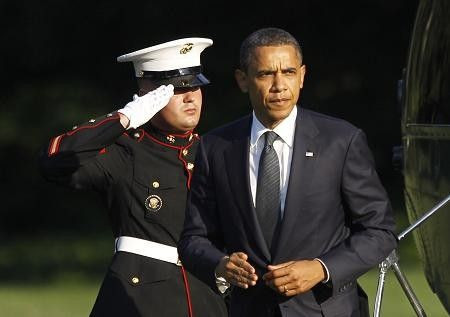US To Supply Weapons To Syrian Rebels, Officials Say

The White House signaled Thursday that it would begin providing arms to some rebel forces fighting the Assad Regime, significantly escalating the United States’ involvement in the Syrian civil war. But the details, including what weapons will be supplied, remain unclear.
The decision comes after the U.S. and allies determined that Bashar al-Assad had used chemical weapons, crossing what President Obama has signaled is a “red line” that would trigger further U.S. involvement. Rebel forces have pleaded with allies to send weapons as Assad’s forces have taken the upper hand in the conflict.
In addition to arming rebels, the White House is considering a plan for a limited no-fly zone. If approved, U.S. and allied planes, based in neighboring Jordan, would protect air space over Syria along the border with Jordan where rebel forces could train, according to the Wall Street Journal. The escalation represents a major shift in the Obama administration’s approach to the conflict, which up till now had been limited to providing non-lethal support.
However, the extent of the weapons that the administration, with the coordination of the Central Intelligence Agency, will provide is not certain. According to the New York Times, officials have not ruled out antitank weapons but say that they are not considering antiaircraft weapons the rebels have requested.
The Syrian conflict has divided Obama’s national security team and presented the president with one of the most difficult situations of his presidency; media reports over the past several months portray the president as wrestling with the question of how to respond to a conflict that poses significant geopolitical and military risks, not the least of which is allowing American arms to fall into the hands of terrorists. But a strategy of more limited engagement, critics have argued, has meant that the U.S. has failed to act during a humanitarian crisis. A United Nations report found that more than 90,000 people have now died during the 27-month conflict.
After months of indecision, the situation itself has become dire enough that it seems to have left the White House little choice, the Journal reported. Assad’s forces are moving on the city of Aleppo, where, without outside aid, they could strike a significant blow to moderate rebel forces.
Meanwhile, in the Kremlin, the news of the U.S. escalation drew criticism from Russia -- Assad’s most powerful backer -- where a top official denied the use of chemical weapons. “Information about the usage of chemical weapons by [Syrian President Bashar al] Assad is fabricated in the same way as the lie about [Saddam] Hussein's weapons of mass destruction [in Iraq],” said Alexei Pushkov, leader of the Russian lower house’s international affairs committee, the Christian Science Monitor reported.
But the policy shift is welcome news to a group of lawmakers who have been pushing for increased involvement, including Republican Sens. John McCain, R-Ariz., and Lindsey Graham, R-S.C. Their cause received a boost this week when former President Bill Clinton, citing humanitarian concerns, also endorsed a bigger role for the United States. On Friday, Clinton responded to escalation by saying the administration was moving in the "right direction."
© Copyright IBTimes 2024. All rights reserved.






















